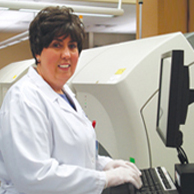PROService Remote Service Tool
PROService is a remote service tool that helps improve your laboratory system uptime. When your system is not working properly, we can troubleshoot and fix it faster with PROService. PROService is provided at no additional cost to you.*
How PROService Can Benefit Your Laboratory
- Enables us to identify potential issues before they impact your laboratory
- May resolve instrument issues immediately without the need to wait for a service visit
- Enables faster repair times
- Helps protect instruments from data security and virus threats
- May enable additional remote connectivity capabilities, such as metering and analytics
Complete the questionnaire form
PROService Features
Intelligent diagnostics
PROService elevates your support experience beyond the traditional model of over-the-phone troubleshooting.
Service dashboard
Intelligent algorithms embedded in the service dashboard allow our service and support staff to spot trouble areas and rule-in/rule-out sources of error. Interactive icons allow support staff to drill down to the root cause of the issue to help resolve it.
Proactive diagnostics
PROService can also identify potential future instrument issues, allowing them to be addressed before they further impact the efficiency of your laboratory.
PROService triggers are sophisticated algorithms that scan the incoming stream of instrument data for potential causes of downtime. When the criteria of a trigger are met, PROService automatically notifies our service and support staff, so we can further investigate and address the potential issue. Whether the problem is addressed through preventative action taken by you or by a routine visit from our service and support staff, the result is the prevention of future instrument downtime.
Interface features
The remote upload feature gives our service and support staff the ability to retrieve instrument data in order to perform troubleshooting analysis. It also enables updates for software versions, databases, help files and reagent files/settings.
Remote setup/configuration features allow us to perform system setup and configure add-on tests remotely to get your systems and reagents up and running in a shorter amount of time.
PROService is available for the following Beckman Coulter diagnostics instruments
Automation
- AutoMate 600 sample processing system
- AutoMate 800 sample processing system
- DxA 5000
Blood Banking
- PK7400
Chemistry
- AU680 chemistry analyzer
- DxC 700 AU chemistry analyze
- DxC series chemistry analyzers
- AU5800 series chemistry analyzers
Hematology
- DxH 600/690T/800/900/SMS hematology analyzers
- LH series hematology analyzers
Immunoassay
- Access 2 immunoassay analyzer
- DxI series immunoassay analyzers
Information systems
- REMISOL Advance software
How connectivity is established
To establish connectivity, a Remote Application Processor (RAP) box (a small form factor computer without a keyboard, or mouse or a monitor measuring 10.6”wx1.6”h x 5.7”d) is connected to each of your Beckman Coulter systems via an Ethernet cable. The RAP box is then connected to the internet via an Ethernet port provided by your facility (Wi-Fi and cellular network internet connectivity options are available in certain geographies). Each RAP box may connect up to five systems/instruments. If your facility requires multiple RAP boxes, each RAP box needs an internet connection.
How PROService communicates
PROService receives information by using the instrument workstation, which sends instrument performance data to the Remote Monitoring System (RMS) RAP box. The RAP box then secures this data and forwards it to our servers. All communications between your connected instruments and us are coordinated through the RAP box.
The RMS RAP box is connected to your network using a static or Dynamic Host Configuration Protocol IP address. The RAP box communicates through your existing network to our servers only. Two types of connections will routinely be made during PROService operation.
Outbound-initiated data messages are secured via encryption and sent through your firewall via HTTPS on Port 443, the standard port for secure internet usage. In most cases, this port will already be open in your firewall. Information is transmitted using Secure Sockets Layer (SSL), a protocol for transmitting information securely via the internet. SSL creates a secure connection between a client and a server, over which data can be sent securely.
If a proxy server is in place, RMS will adjust automatically after it is configured using information provided by your IT department. However, at this time, we have limited support for Microsoft IIS proxy servers which utilize user authentication.
No additional resources should be necessary to support PROService data transmission. Typical data packets are 2 KB or less at intervals of approximately every 30 seconds. For desktop sharing and software updates, 128 kbps bandwidth is required.

PROService Information
Brochures
Technical and Design Highlights
Get the RMS technology, architecture and security information your IT professionals need.
Protect and Ensure Continuous Workflow
Get the DxONE PROService remote service application to protect and ensure your workflows
 English
English


